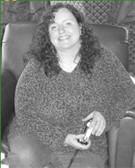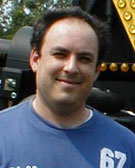|
|
||||||||||||


What
Happens (Read my story on our "Meet Pure Jeevan" page.) Largely Vegetarian: Raw Vegan: (Read my story on our "Meet Pure Jeevan" page.) NOTE: The Google ads below help financially support Pure Jeevan. However, we do not specifically endorse these advertisers.
|
Interview
Transcript: Andy Grant
|
|||||||||||
|
Below is our complete archived interview with Andy Grant of Grant Family Farms, which was the first farm certified organic by the state of Colorado. Today, they farm 3,000 acres in the foothills of the Rocky Mountains about an hour north of Denver. This continues our ongoing "Know the Growers" series, in which we will be interviewing organic farmers around the world for NaturalNews.com. We hope you enjoy this informative series of articles. -Jim & Wendi Dee JIM: Andy, reading over your web site, it looks like the inspiration for all this came from your father, Lewis Grant, right? ANDY: Well, actually my dad was a professor at Colorado State University ... and I grew up around him having a weekender farm, a hobby farm. From a very early age, the bug hit me. I loved farming and I loved growing vegetables. And so, whereas he was a professor at Colorado State University, I was the kid that grew up around his weekend farms that wanted to figure out how to make a career and a living out of it. JIM: And so you just got into it? Did you just buy farmland when you got to be a certain age? ANDY: I went to Colorado State University and I actually started farming on my own in high school and all the way through college -- although that's been a lot of years ago now. But, it's just gradually over the last couple of decades continued to grow. I bought some land on my own and we rent quite a bit of land from our neighbors, and have developed Grant Family Farms to the point it is today. JIM: So, the word "family" in Grant Family Farms... Is the Grant family involved? ANDY: It is. My father is 86 years old but astounds everybody with his energy. He's very interactive and active on a daily basis -- kind of watching and helping consult and telling the youngsters how we should do it better, of course, as dads do. I have several sisters that are involved in our CSA in Colorado Springs and in Denver. When we came up with the business name Grant Family Farms in the late 90s (because it's gone through different transformations), the family was actually chosen as a name from our employees. I let the employees name what the farm was going to be. And the family, they signified as including them. So, Grant Family Farms, you think of myself and my dad and sisters, but the story of the beginning is that the family really means a lot of people that have worked with me on the farm for going on 30 years, and that was them. JIM: Is there a younger generation of Grants that will... ANDY: No, not so much, but over the last 25 years and 30 years, there's a lot of people who have been here and their children are becoming involved. The farm will continue for sure. JIM: So, I'm speaking with you in mid January, and I was wondering what happens at a Colorado farm in mid-January. Is everything in hibernation mode, or... ANDY: Well, I'll tell you what... It's Saturday evening and I'm overwhelmed with how much work I still have to do that I didn't get done this week. JIM: Wow. ANDY: We have a livestock operation. We have hens and broilers and lambs to take care of. We're ramping up for 2009 CSA season, signing up members to our CSA. There's a lot of repair work to do on all the equipment, getting prepared for when the frost is out of the ground in mid-February. We've got to hit the fields early and fast to make it all work. And, just the business of running the business. So, really the notion of a farm not really having much to do in the winter doesn't exist in Colorado. JIM: About a year ago, my wife and I were doing some personal research into air quality in the USA. We were trying to find the cleanest air in the whole country and, pretty much right up where you're at -- north of Denver / south of Cheyenne -- came up tops in the list. I was wondering if the people who live there know that or pay much attention to that. ANDY: Well, I was born and raised here and I didn't even know that, but it doesn't surprise me because, especially in the winter, it's kind of windy here. You get south into Denver and they have some issues around air quality. But, I love living where we do. We see the upper peaks of the Rocky Mountain National Park every day. We're up on the Cheyenne ridge and it's a great place to live. JIM: It must also add something else to the whole experience of organic farming in an environment that's that clean... ANDY: You know, that's what we've kind of talked about for many years. Where we farm, there's really no agriculture to the north or west of us. And that's where our water come from, from the mountains. And our air is clean. We've done a ton of lab tests on our products over the last 30 years for different customers to prove that we don't have any residues. Just about anywhere in the world, any kind of food testing that's done, they can still find traces of DDT, in almost every environment. And, over 30 years of testing, we've never once had any positive indication of residual DDT or any chemicals in any of our foods. So, it must speak to the environment we live and farm in. JIM: We talked before about livestock and so forth, but in terms of the vegetables and herbs and produce, I notice that your product availability is generally May through November. You said you kind of start getting into the fields in February... I was wondering, are there farms up your way that try to extend the growing season with greenhouses and things like that? ANDY: Not really. We're about the only ones, and we only have a couple smaller greenhouses. We have tomatoes into December. But, right around us, there really isn't that much that try to extend. I think it's a huge opportunity as people become more interested in local food and organic food, as that market grows. Usually, in American agriculture, supply will meet demand. Demand needs to be there and people will figure out how to supply it. JIM: So, you guys do have greenhouses... ANDY: Yes, just a couple of small ones. They're 30' x 100'. We use them mostly to start a lot of our transplants. But, in the late summer and fall, we grow heirloom tomatoes in them. JIM: Speaking of individual crops, I had a few questions about some individual vegetables. These might seem bizarre, but I thought I'd ask anyway... So, I eat a ton of cucumbers, organic ones. But, these things are really pricey. They seem representative of a vegetable that is much more expensive organic versus conventional. I still buy them, but is that a tough crop to bring in via organic methods? ANDY: No, not really. On the east coast or the south it would be because of disease problems and insect problems. They're really not a tough thing for a farm in the western U.S. to grow. But, what a consumer pays at retail rarely reflects what the farmer is getting. You know, it's a food system and, from the producer through the wholesaler and distributor into retail. What you see as far as market price, what you as a consumer pays, for the most part has little bearing on what the grower is paid. JIM: So it's just supply and demand... ANDY: Supply and demand and, you know, retailers need to make money too. They price things based on elasticity models and they know the items in their produce department that they can charge a lot of money for and people will still buy them. And they know the ones that are elastic, that if they lower the price, they'll sell a ton more. A good example would be an onion. A retailer is going to keep that price up because, by dropping their price, it really doesn't stimulate more demand. But if a retailer will drop a price on strawberries, it will exponentially increase demand. So, they'll use strawberries as a lead to get people shopping in their store. The "hardware items," if you will, like frequently lettuce or cucumbers or onions -- doesn't really matter what price they charge; those that want them will still buy them, so they have a higher margin. JIM: Let me ask you a newbie farming question... In terms of crop rotation, if you're going to grow, say, two main crops... For example, at your farm, I notice you guys grow a lot of greens and squash. Would it be considered good crop rotation to switch those two things back and forth in the fields? ANDY: We generally try to have a five-year rotation in our fields, where we're not growing spinach after spinach. In a five-year rotation, we might have a year of corn, we might have a year of spinach or lettuce, we might have a year of squash, we might have then a year of wheat. Wheat is a good one. We like growing dry beans because they're really good -- not only a cash crop, but good for the soil. They're a legume and fix nitrogen. But, generally, just good farming practices: We'd prefer a vegetable crop not being in the same land but every five years because that's the best first defense toward disease, pests, or any other problems. JIM: So, when you have 3,000 acres to keep track of, does that get kind of complicated? Do you have spreadsheets, or... ANDY: Oh, absolutely. We've got mapping and we've got a full-time guy who's been with us for many, many years. That's what he does is keep track of where we planted what, and when, and laying out what crop we're going to plant there next year. JIM: Wow, I hope you guys back up that database. [laughs] ANDY: Yeah. [laughs] JIM: Speaking of the business end of things, how does the seasonal aspect of farming affect you? Are workers at a big farm like yours looking for year round income? Is it tough to hold onto people? How does that work? ANDY: Well, that's a tough one. From a management standpoint, good people need full-time, full-year jobs. We try to provide as many of those as possible, but as a seasonal farm in Colorado, we can only do that on a limited basis. In the winter time, we probably have 20 people -- from mechanics and tractor drivers to people in the office and people in finance that work the farm year round. But then in the summertime, we need a couple hundred people. So, we have people that have worked for us for many, many years who kind of plan that and they work for us from April through November. Then they may even have to travel out of state to Florida from December through March to make their income work. JIM: Kind of a related question: There are a lot of initiatives for people who like to work on organic farms, like WWOOFers [the Willing Workers on Organic Farms]... ANDY: We're aware of the WWOOFers, and we're somewhat intrigued by it. But we're a working farm, and it's about timing and efficiency for us. So, we're trying to figure out how to offer the opportunity of apprenticeships or internships or even WWOOFers. We haven't really figured it out because we're a business farm; we train our people and we need to depend on them on a daily, weekly, monthly basis. But this last year, we took on, for the first time in a long time, an apprentice. And he really worked out well. He had a tremendous work ethic and really stuck to it, learned and worked hard. So, it's given us kind of a hope that we could start to develop those kinds of opportunities for people interested in what we do and want to learn about farming. But the WWOOFers... I think we'll probably sign up this spring and experiment with it. But to have somebody who just comes here for a day or two, or a week... you spend so much time just teaching them a training them on what they need to do, and then they're gone. JIM: Yeah... ANDY: And that's not a model that works very well for our business. We need people day-in and day-out. JIM: You'd be looking to develop some sort of a more long-term intern program where they come and they really spend some serious time. ANDY: Absolutely. And I know a lot of the smaller farms and smaller CSA models, they almost depend on that internship labor to make it work. And that doesn't work for us because we have to make things happen on a daily basis. JIM: Are there a lot of conventional farms, meaning non-organic, in your area of the country? ANDY: Yeah, well Colorado is a huge agricultural state. Certainly, a vast majority of Colorado agriculture is conventional. I can say, around us -- north of Fort Collins -- it's striking over the last 25 years how many farms around us have watched us and then converted to organic. I'm sure Larimer County probably has one of the highest certified percentages of farmed acres. All of our neighbors, for the most part, are now certified organic farmers. JIM: Well, what I was wondering about that was, since you have some crops where the conventional guys are doing GMO stuff, do you ever worry about cross-contamination? ANDY: We don't have any conventional farms around us with GMO crops. To the west there's no agriculture, to the north there's no agriculture, and everybody to the east and south has now converted their acreage to organic. JIM: You guys have a nice web site. It's not just farming information, but recipes and all sorts of things. It seems like that, along with the commercial side, it looks like you're a local destination. Are there activities and things? ANDY: No, we're a working farm. There are farms down toward Denver that get more involved in agri-tourism. But we're kind of nose-to-the-grindstone kind of guys. We farm to grow food. JIM: So, that stuff on the web site is just online sales stuff? I thought I saw some stuff like things you can buy from the web site. ANDY: Well, we sell CSA memberships, and you can buy meat on our web site. JIM: Oh, okay. ANDY: You might have been looking at... We have a home and garden store in Cheyenne. It's a side business, and they're just developing that. But the farm is the crux of what we do. Now we do, in the fall, as an appreciation for our CSA members, we have what's called a "harvestival." That's when we invite our CSA members to come out in October and bring the kids. We have hay rides, and they can get a free pumpkin. As we have lots of music and food -- kind of a harvest celebration where we engage with the community and they participate and spend a day on the farm. JIM: Well, speaking of the CSA program, when did that start? ANDY: Well, it's kind of interesting. When I was in college back in the late 70s, and I was starting to farm organic vegetables, I really tried to start a subscription business where people would commit in advance of the season to a certain amount of produce. There wasn't really a CSA model that I knew of at that time. We were just trying to make something like that work where the consumer could kind of step up in the planting season and say "I want this." But our society and culture really wasn't ready at that time. So, it really didn't do well. So then I went toward trying to find customers for the things we grew. So, the next couple decades, I grew by engaging more and more retailers, from Kroger and Safeway and Albertsons, [to] Whole Foods and HEB down in Texas. A farmer's got to find somebody to buy the product. Well then two tears ago, because there has been such an interest in local food -- and of course the books "Omnivore's Dilemma" and "Animal, Vegetable, Miracle" have really spawned a lot of interest in people -- we retried a CSA concept in 2007. [Interviewer's note: Those books are: "The Omnivore's Dilemma: A Natural History of Four Meals" by Michael Pollan, and "Animal, Vegetable, Miracle: A Year of Food Life" by Barbara Kingsolver, Camille Kingsolver, and Steven L. Hopp.] JIM: Okay... ANDY: We had a learning curve. That first year we had 126 member families, in 2007. In 2008, we were ambitious and hoped to grow it to 500 member families. We actually ended up with over 1,000. JIM: Holy cow! ANDY: Our goal for this coming year for our CSA is 2,500 member families. And it's just awesome. We get so much positive feedback, which is good for a farmer to hear every once in a while. Positive feedback and people that are very into what we're doing. We've done a good job for them and it's awesome; every CSA share we sell means there's one box of produce every week that we're not having to load on a semi truck and ship to Texas or the east coast or Atlanta or Florida. It's really exciting that the food we're growing is going to a local community that are appreciative of what we do. JIM: CSA's great. We've tried a few different ones here in Pittsburgh and it's great. It's a wonderful model and I'm glad to hear it's going well for you. ANDY: Yes. JIM: So, looking back on the history of where the Grant Family Farm came from and considering where you're at today, what other long-term objectives do you have, aside from the development of your CSA -- for example, new crops, new facilities? ANDY: Well, first of all, new facilities come out of profit and, I'll tell you what, farming has not been a very lucrative venture of late. Mostly, Colorado just had an epic draught for six years that really hurt us, and then the last two years (we think we're out of the draught) we've absolutely been trashed by hail. But, in saying that, we'd certainly like to improve our facility. But, I would say our long-range goal is to really try to develop that connection with our community in Colorado and Wyoming and grow our CSA. I would say that goal would be that the majority of what we grow goes into our local community. Even if we grow this year to 2,500 member families of our farm, that still only represents 10% of our total production. So, we have a ways to go. Our goal would be that the food we grow stays home and goes to people that live right here. [Update: When I spoke with Andy again several weeks later to clarify a few things from this interview, I had a chance to ask about Grant Farm's CSA membership goal. He replied, "It is amazing the support. We just started signups in February and already have 900 member families! With that kind of trend I think we will easily reach our goal ... and surpass it."] JIM: So, does the food that you grow for the CSA, is that the same crops you're growing for shipping? ANDY: Well, a lot of them are, but then we also grow small amounts of specialty crops that we don't offer to the retail or wholesale trade, and we grow them specifically for our member families. JIM: So, at the beginning of the year, when you figure out how many people you do sign up -- say it's 3,000 (let's be optimistic) -- from that point forward, you'd say, "Okay, I know how much I'd need to plant"... ANDY: Sure. JIM: Yeah, so you'd just work it from there. ANDY: Well, you know, if our members will sign up early in January and February, it definitely helps the farm financially to have the funds to buy seed, make payroll, fix tractors and all that stuff. But, it also gives us a good early indication of how much of particular specialty things we'll grow for them. JIM: Speaking of the seed stock, do you produce and of that yourself? ANDY: No, we really don't. We do grow seed for some of the seed companies. But, in agriculture you need to stay focused on what your mission is, and our mission is to grow food crops -- not grow seeds and try to figure out how to do everything. We're better to take part of it and try to do it well. JIM: Well, that was a non-farmer question. I still don't know enough about organic farming to know whether it's better to grow your own seed or... ANDY: No, I think it's better to focus on what you're good at. JIM: Right. I guess you just need to get the good stuff, the good seeds. ANDY: Well, after 30 years, we know which varieties perform well in our climate. Got a question you'd like answered by an organic farmer? Are you an organic farmer who'd like to be interviewed? Know an organic farming operation you'd like us to interview? Email Jim at Rawdiant [at] Gmail.com and we'll see what we can do to provide you with the information you want!
We wish for you a
love- and life-filled |
DISCLAIMER: Using this site constitutes your full agreement with this disclaimer. The information at PureJeevan.com is made available for educational purposes. PureJeevan.com assumes no responsibility for any adverse effects or consequences that might result from using information presented here or on any site we link to. The information presented on our site (1) is not medical advice, (2) is not intended as medical advice, and (3) is not intended to propose a cure for any disease or condition. We recommend consulting your health care professional prior to starting any medical treatment. PureJeevan.com shall have no liability whatsoever for any direct, indirect, special, or consequential damages relating in any way to the use of any information presented on our site or any site we link to. Any links to outside sites do not constitute our endorsement of products or services found on those sites. COPYRIGHT � 2009 PureJeevan.com. All graphics on this site were either self-created, used with permission, or taken from royalty-free web design sites.





 The
Colorado Organic Scene: An Interview with Andy Grant of Grant Family Organic
Farms
The
Colorado Organic Scene: An Interview with Andy Grant of Grant Family Organic
Farms